牛津译林版模块3 Unit 2 Language Welcome to the unit and Reading 1课件(35张ppt)
文档属性
| 名称 | 牛津译林版模块3 Unit 2 Language Welcome to the unit and Reading 1课件(35张ppt) |
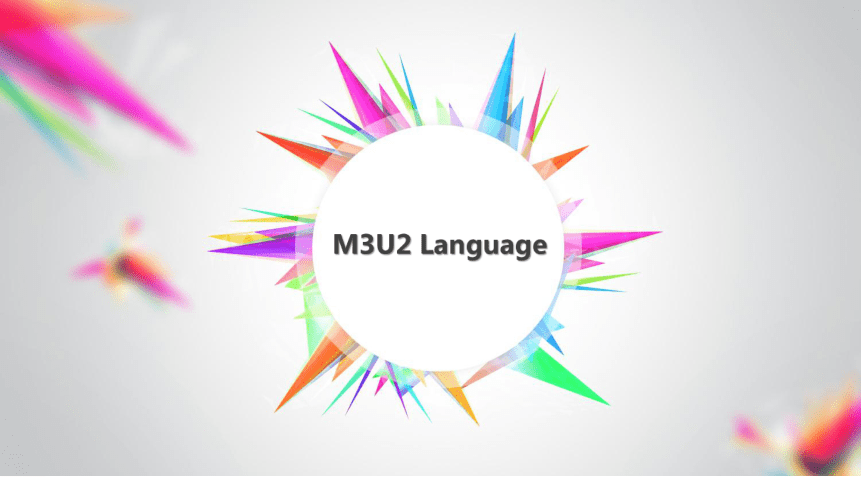
|
|
| 格式 | zip | ||
| 文件大小 | 4.0MB | ||
| 资源类型 | 教案 | ||
| 版本资源 | 牛津译林版 | ||
| 科目 | 英语 | ||
| 更新时间 | 2020-04-16 00:00:00 | ||
图片预览

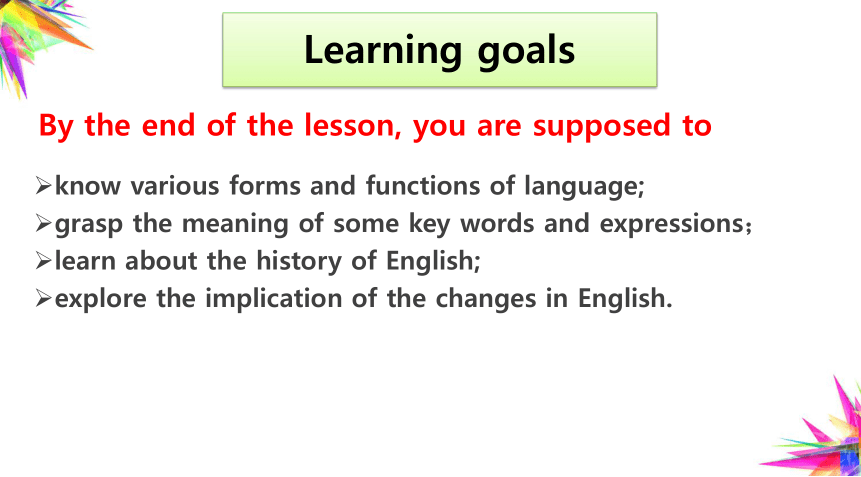
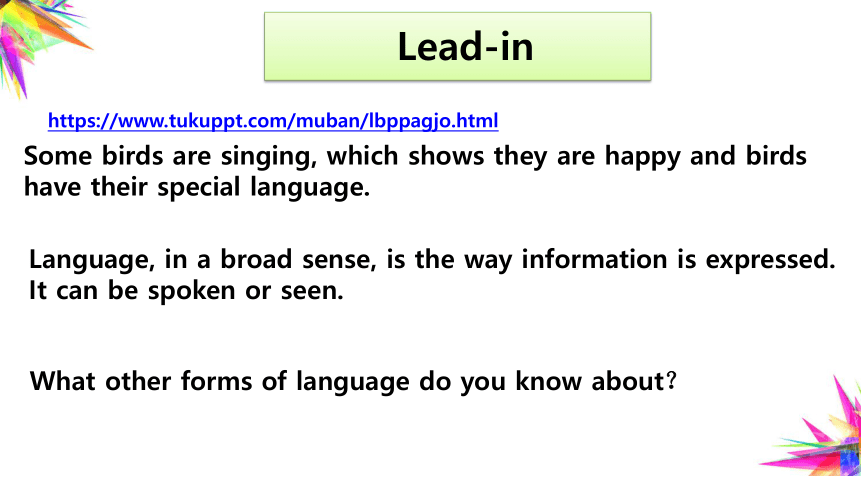
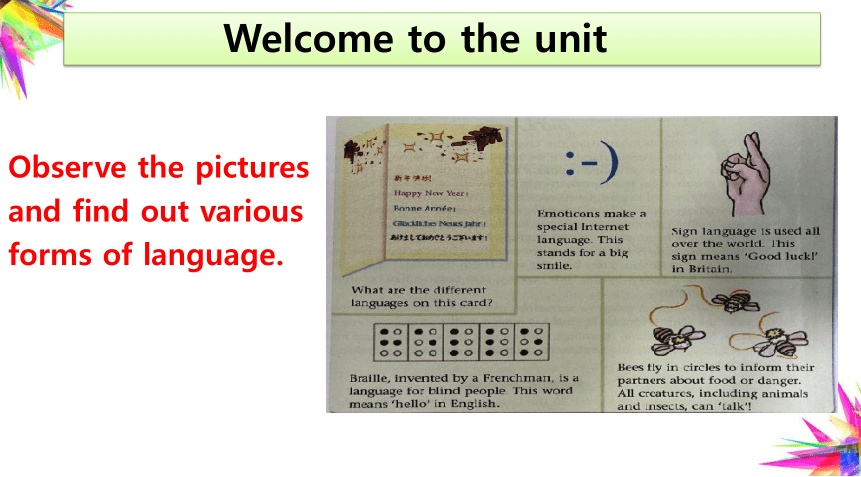
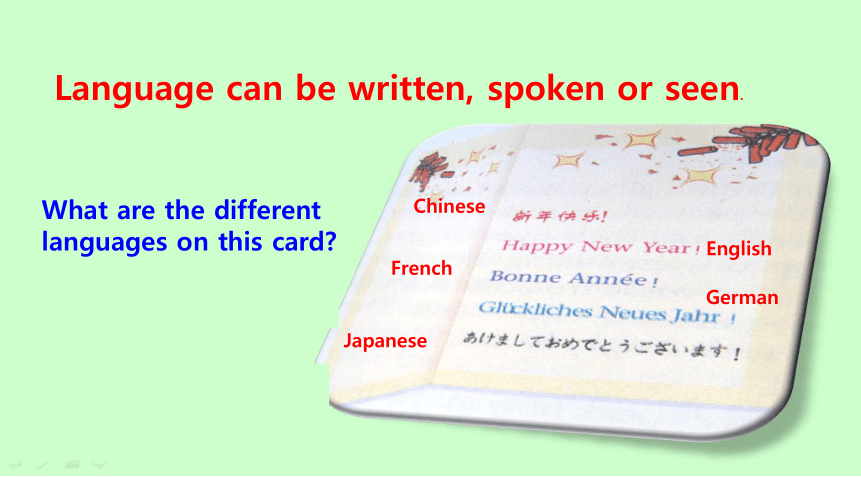
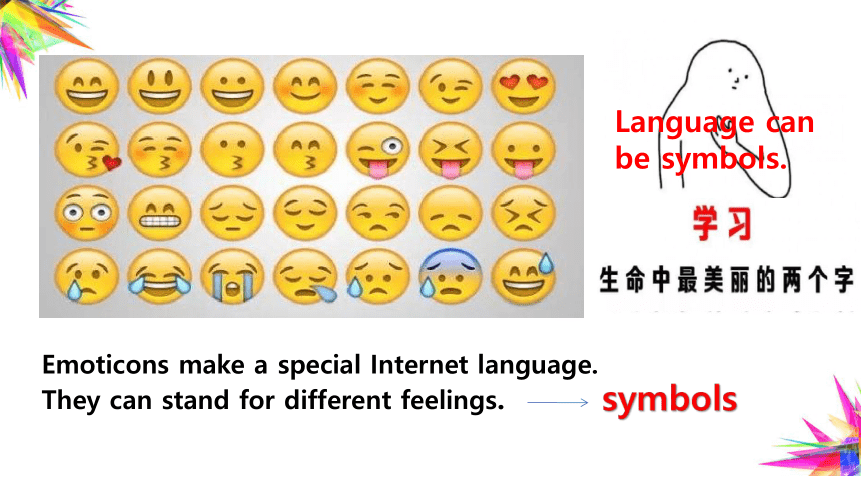
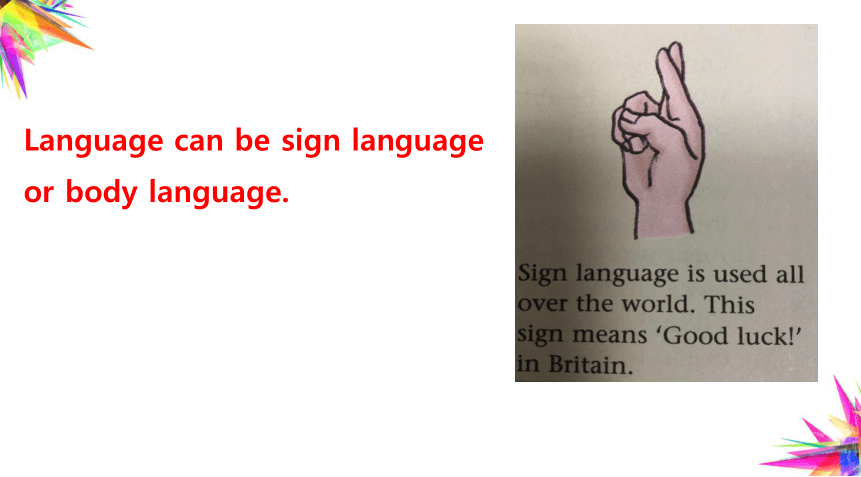
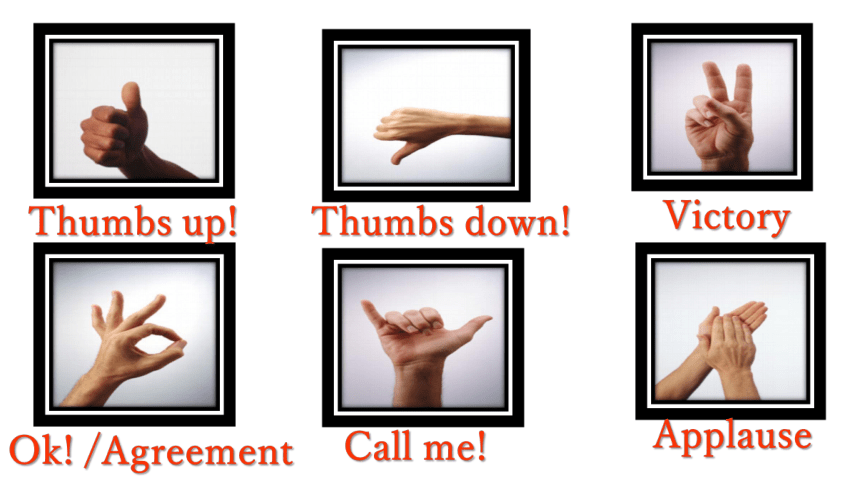
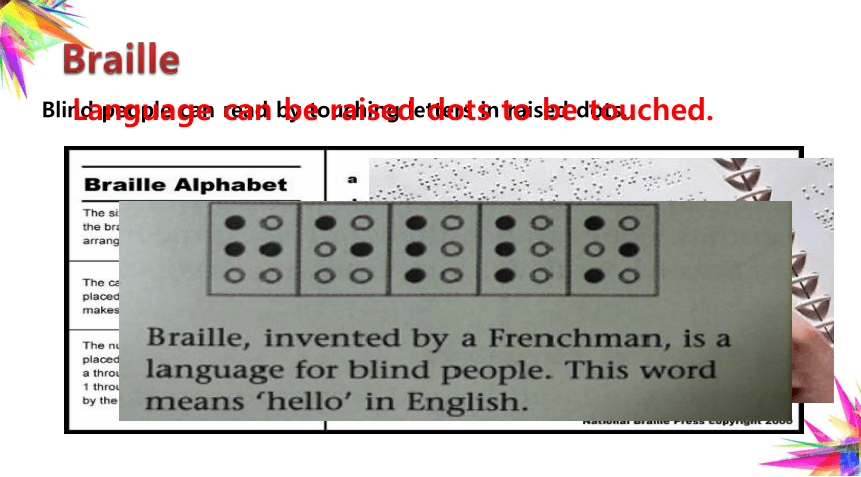
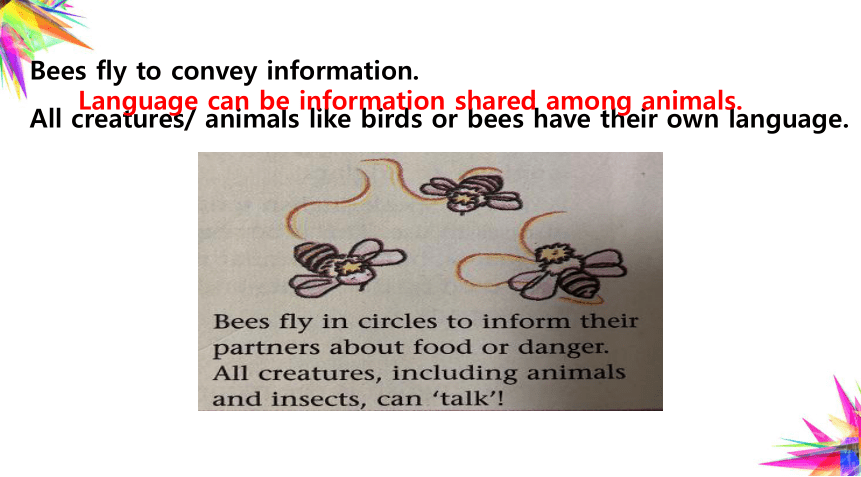
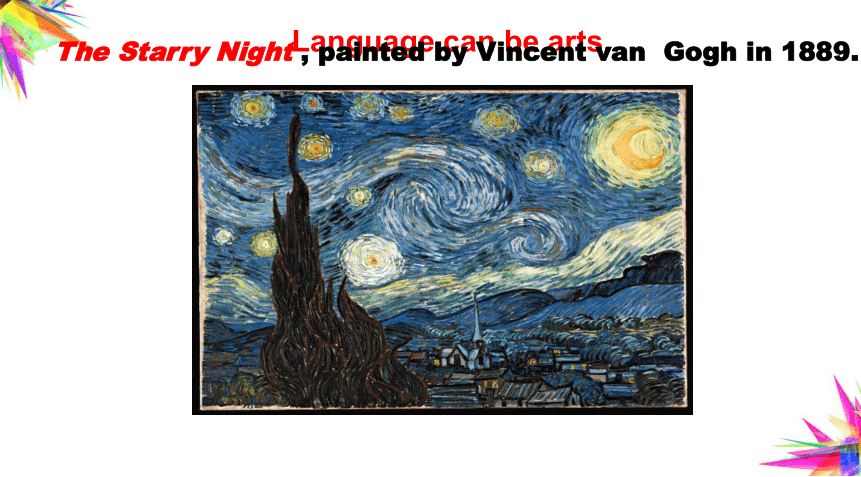
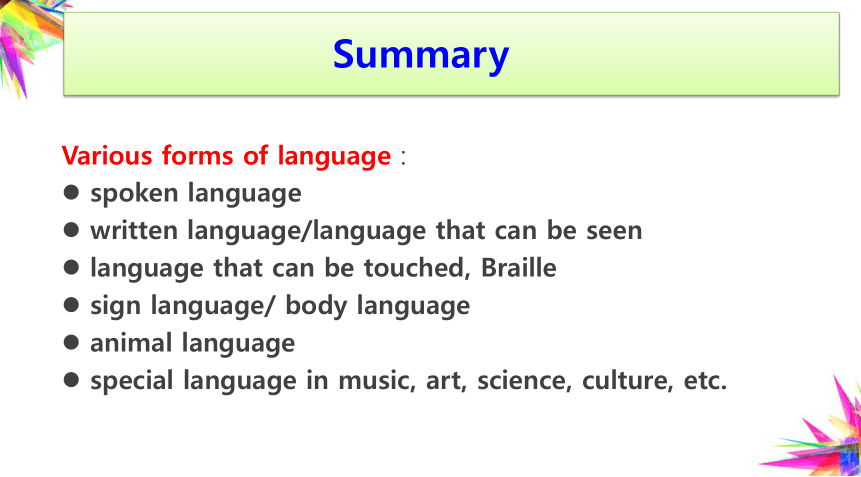
文档简介
(共35张PPT)
M3U2 Language
Learning goals
By the end of the lesson, you are supposed to
know various forms and functions of language;
grasp the meaning of some key words and expressions;
learn about the history of English;
explore the implication of the changes in English.
Lead-in
Language, in a broad sense, is the way information is expressed.
It can be spoken or seen.
What other forms of language do you know about?
Some birds are singing, which shows they are happy and birds
have their special language.
https://www.tukuppt.com/muban/lbppagjo.html
Observe the pictures
and find out various
forms of language.
Welcome to the unit
What are the different
languages on this card?
Chinese
English
French
Japanese
German
Language can be written, spoken or seen.
Emoticons make a special Internet language.
They can stand for different feelings.
emoticon
symbols
Language can
be symbols.
sign language
Language can be
or body language.
Thumbs up!
Thumbs down!
Ok! /Agreement
Victory
Applause
Call me!
Braille
Blind people can read by touching letters in raised dots.
Language can be raised dots to be touched.
Bees fly to convey information.
All creatures/ animals like birds or bees have their own language.
Language can be information shared among animals.
Language can be arts.
The Starry Night , painted by Vincent van Gogh in 1889.
Summary
Various forms of language :
spoken language
written language/language that can be seen
language that can be touched, Braille
sign language/ body language
animal language
special language in music, art, science, culture, etc.
What are the functions of language?
To express one’s feelings.
To convey /express information.
To help people communicate with each other.
To function as a carrier (载体)of culture, science,
philosophy, arts, music, religion, literature, etc.
To serve as a tool for people to know about the world.
What language is spoken by most people in the world?
What language is spoken by the second largest group
of people in the world?
Chinese.
English.
Reading
English and its history
I. Vocabulary learning
Pronounce some proper nouns.
I. Vocabulary learning
Word-reading: 请选出以下每一组四个词中与其他三个类别不同的词:
A. language B. grammar C. vocabulary D. pronunciation
A. pork B. beef C. mutton D. cow
A. housen B. sheep C. children D. shoen
A. Celtic B. the Angles C. the Saxons D. the Vikings
I. Vocabulary learning
Word-reading: 请选出以下每一组四个词中与其他三个类别不同的词:
A. language B. grammar C. vocabulary D. pronunciation
A. pork B. beef C. mutton D. cow
A. housen B. sheep C. children D. shoen
A. Celtic B. the Angles C. the Saxons D. the Vikings
occupy (Line 10 )
consist of ( Line 10)
aside from ( Line 12)
4. take control of ( Line 27)
5. entire ( Line 30)
6. raise ( Line 36)
whole
except; besides; except for
enter a place by force and
begin to rule over it
d. take care of
e. be made up of
f. get power over
Match the words with the correct meaning .
_________
_________
_________
_________
_________
_________
e
f
c
b
a
d
I. Vocabulary learning
occupy ; consist of ;aside from; take control of; entire; raise
I was born and ________________ in a small town outside Shanghai.
Your composition is well written, __________________ a few mistakes.
My ____________ family gets together for dinner every Saturday night.
This new English book _______________ grammar and vocabulary exercises.
Who will ________________ the company when the manager leaves next month?
The workers _____________ the factory, asking for more money.
raised
aside from
entire
consists of
take control of
occupied
I. Vocabulary learning
Choose one and fill in the blanks with proper forms
English and
its history
A brief (1) _____________
to the English language.
The (2) _______________
of the English language.
(3) __________ English.
(4) __________ English.
(the 12th to 15th century)
(5) __________ English.
Before the (6) ___________
of the 5th century
At the (7) ___________of
the 9th century
By the 10th century
In (8) __________
During the (10) ________________
in the 16th century
II. The outline of the article
introduction
Middle
Old
Renaissance
1066
end
middle
Modern
development
By the (9) _________ half of the 14th century.
In 1399
latter
From the 5th to the 6th century
Time Details
Before the middle of the 5th century People in Britain all spoke a language called (1) C______________.
From the 5th to the 6th
century The language of Germanic groups gave (2) b________________ to Old English, which
(3) _______________ (replace) Celtic.
At the end of the 9th
century The language the Vikings brought became a (4 ) p____________ of Old English.
By the 10th century Old English had become the official language of England.
From 1066 to the latter
half of the 14th century Many words (5) b____________ from French had similar meaning to the words in
English.
The French way of making plurals (6) c_________________ to the development of
Middle English.
Although French was spoken by high-class people, it didn’t take the (7)
p_________________ of English.
By the latter half of the 14th century English had been used (8) _______________ (wide) among all classes in England.
During the 16 th century (9) M___________________ English appeared.
In the future English will keep on (10) __________________ (change).
eltic
irth
replaced
art
orrowed
ontributed
lace
widely
odern
changing
III. Further reading and understanding
Questions & answers:
1. Why does the English language have so many rules that confuse people?
2. Where did the word English come from?
3. Why can words with similar meanings be found in the English language?
4. Who made the greatest contribution to the development from Old English to
Middle English?
5. Why are many of the words for animals different from those for meat in English?
6. Why does Modern English include many Latin and Greek words?
7. Why does the article say the question of whether English will keep on changing
in the future is easy to answer?
Answer the question
1. Why does the English language have so many rules that confuse
people?
Because it is made up of / consists of the grammar and vocabulary
that people from different countries brought with them to Britain.
III. Further reading and understanding
2. Where did the word English come from?
It came from the word Engle, as it was spelt in Old English.
Answer the question
III. Further reading and understanding
3. Why can words in similar meanings be found in the English
language?
These words with similar meanings developed because each
word came from a different language.
Answer the question
III. Further reading and understanding
sick ill
A word once used by the Angles
and the Saxons.
A word once used by the Norwegians.
4. Who made the greatest contribution to the development from Old English to Middle English?
The French-speaking Normans, who took control of England
in 1066.
Answer the question
III. Further reading and understanding
5. Why are many of the words for animals different from those for meat in English?
The words for the animals came from Old English, spoken by people who worked as servants raising animals, while the words for the meat of these animals came from Old French, spoken by the Normans .
Answer the question
III. Further reading and understanding
cow sheep pig beef mutton pork bacon
Old English
Old French
6. Why does Modern English include many Latin and Greek words?
Because Modern English appeared during the Renaissance in the
16th century.
Answer the question
III. Further reading and understanding
7. Why does the article say the question of whether English will keep
on changing in the future is easy to answer?
Because it is certain that this process will continue, and people will
keep inventing new words and new ways of saying things.
Answer the question
III. Further reading and understanding
What is the implication of the changes in English?
Language is always changing due to the development of the world,
including science and technology, so is English.
English has become a global language, with many English -speaking countries accepting more immigrants , who are continuously bringing more changes to the English language.
The world is becoming a more tolerant one, willing to share each
other’s culture and becoming more diverse.
Etc.
IV. Critical thinking
Have you been able to
know various forms and functions of language;
grasp the meaning of some key words and expressions;
learn about the history of English;
explore the implication of the changes in English
?
Homework
Read the article again to get a better understanding of
the history of English.
2. Finish today’s homework assigned on Suzhou Online
Education Center.
Thank you for your attention!
See you next time!
M3U2 Language
Learning goals
By the end of the lesson, you are supposed to
know various forms and functions of language;
grasp the meaning of some key words and expressions;
learn about the history of English;
explore the implication of the changes in English.
Lead-in
Language, in a broad sense, is the way information is expressed.
It can be spoken or seen.
What other forms of language do you know about?
Some birds are singing, which shows they are happy and birds
have their special language.
https://www.tukuppt.com/muban/lbppagjo.html
Observe the pictures
and find out various
forms of language.
Welcome to the unit
What are the different
languages on this card?
Chinese
English
French
Japanese
German
Language can be written, spoken or seen.
Emoticons make a special Internet language.
They can stand for different feelings.
emoticon
symbols
Language can
be symbols.
sign language
Language can be
or body language.
Thumbs up!
Thumbs down!
Ok! /Agreement
Victory
Applause
Call me!
Braille
Blind people can read by touching letters in raised dots.
Language can be raised dots to be touched.
Bees fly to convey information.
All creatures/ animals like birds or bees have their own language.
Language can be information shared among animals.
Language can be arts.
The Starry Night , painted by Vincent van Gogh in 1889.
Summary
Various forms of language :
spoken language
written language/language that can be seen
language that can be touched, Braille
sign language/ body language
animal language
special language in music, art, science, culture, etc.
What are the functions of language?
To express one’s feelings.
To convey /express information.
To help people communicate with each other.
To function as a carrier (载体)of culture, science,
philosophy, arts, music, religion, literature, etc.
To serve as a tool for people to know about the world.
What language is spoken by most people in the world?
What language is spoken by the second largest group
of people in the world?
Chinese.
English.
Reading
English and its history
I. Vocabulary learning
Pronounce some proper nouns.
I. Vocabulary learning
Word-reading: 请选出以下每一组四个词中与其他三个类别不同的词:
A. language B. grammar C. vocabulary D. pronunciation
A. pork B. beef C. mutton D. cow
A. housen B. sheep C. children D. shoen
A. Celtic B. the Angles C. the Saxons D. the Vikings
I. Vocabulary learning
Word-reading: 请选出以下每一组四个词中与其他三个类别不同的词:
A. language B. grammar C. vocabulary D. pronunciation
A. pork B. beef C. mutton D. cow
A. housen B. sheep C. children D. shoen
A. Celtic B. the Angles C. the Saxons D. the Vikings
occupy (Line 10 )
consist of ( Line 10)
aside from ( Line 12)
4. take control of ( Line 27)
5. entire ( Line 30)
6. raise ( Line 36)
whole
except; besides; except for
enter a place by force and
begin to rule over it
d. take care of
e. be made up of
f. get power over
Match the words with the correct meaning .
_________
_________
_________
_________
_________
_________
e
f
c
b
a
d
I. Vocabulary learning
occupy ; consist of ;aside from; take control of; entire; raise
I was born and ________________ in a small town outside Shanghai.
Your composition is well written, __________________ a few mistakes.
My ____________ family gets together for dinner every Saturday night.
This new English book _______________ grammar and vocabulary exercises.
Who will ________________ the company when the manager leaves next month?
The workers _____________ the factory, asking for more money.
raised
aside from
entire
consists of
take control of
occupied
I. Vocabulary learning
Choose one and fill in the blanks with proper forms
English and
its history
A brief (1) _____________
to the English language.
The (2) _______________
of the English language.
(3) __________ English.
(4) __________ English.
(the 12th to 15th century)
(5) __________ English.
Before the (6) ___________
of the 5th century
At the (7) ___________of
the 9th century
By the 10th century
In (8) __________
During the (10) ________________
in the 16th century
II. The outline of the article
introduction
Middle
Old
Renaissance
1066
end
middle
Modern
development
By the (9) _________ half of the 14th century.
In 1399
latter
From the 5th to the 6th century
Time Details
Before the middle of the 5th century People in Britain all spoke a language called (1) C______________.
From the 5th to the 6th
century The language of Germanic groups gave (2) b________________ to Old English, which
(3) _______________ (replace) Celtic.
At the end of the 9th
century The language the Vikings brought became a (4 ) p____________ of Old English.
By the 10th century Old English had become the official language of England.
From 1066 to the latter
half of the 14th century Many words (5) b____________ from French had similar meaning to the words in
English.
The French way of making plurals (6) c_________________ to the development of
Middle English.
Although French was spoken by high-class people, it didn’t take the (7)
p_________________ of English.
By the latter half of the 14th century English had been used (8) _______________ (wide) among all classes in England.
During the 16 th century (9) M___________________ English appeared.
In the future English will keep on (10) __________________ (change).
eltic
irth
replaced
art
orrowed
ontributed
lace
widely
odern
changing
III. Further reading and understanding
Questions & answers:
1. Why does the English language have so many rules that confuse people?
2. Where did the word English come from?
3. Why can words with similar meanings be found in the English language?
4. Who made the greatest contribution to the development from Old English to
Middle English?
5. Why are many of the words for animals different from those for meat in English?
6. Why does Modern English include many Latin and Greek words?
7. Why does the article say the question of whether English will keep on changing
in the future is easy to answer?
Answer the question
1. Why does the English language have so many rules that confuse
people?
Because it is made up of / consists of the grammar and vocabulary
that people from different countries brought with them to Britain.
III. Further reading and understanding
2. Where did the word English come from?
It came from the word Engle, as it was spelt in Old English.
Answer the question
III. Further reading and understanding
3. Why can words in similar meanings be found in the English
language?
These words with similar meanings developed because each
word came from a different language.
Answer the question
III. Further reading and understanding
sick ill
A word once used by the Angles
and the Saxons.
A word once used by the Norwegians.
4. Who made the greatest contribution to the development from Old English to Middle English?
The French-speaking Normans, who took control of England
in 1066.
Answer the question
III. Further reading and understanding
5. Why are many of the words for animals different from those for meat in English?
The words for the animals came from Old English, spoken by people who worked as servants raising animals, while the words for the meat of these animals came from Old French, spoken by the Normans .
Answer the question
III. Further reading and understanding
cow sheep pig beef mutton pork bacon
Old English
Old French
6. Why does Modern English include many Latin and Greek words?
Because Modern English appeared during the Renaissance in the
16th century.
Answer the question
III. Further reading and understanding
7. Why does the article say the question of whether English will keep
on changing in the future is easy to answer?
Because it is certain that this process will continue, and people will
keep inventing new words and new ways of saying things.
Answer the question
III. Further reading and understanding
What is the implication of the changes in English?
Language is always changing due to the development of the world,
including science and technology, so is English.
English has become a global language, with many English -speaking countries accepting more immigrants , who are continuously bringing more changes to the English language.
The world is becoming a more tolerant one, willing to share each
other’s culture and becoming more diverse.
Etc.
IV. Critical thinking
Have you been able to
know various forms and functions of language;
grasp the meaning of some key words and expressions;
learn about the history of English;
explore the implication of the changes in English
?
Homework
Read the article again to get a better understanding of
the history of English.
2. Finish today’s homework assigned on Suzhou Online
Education Center.
Thank you for your attention!
See you next time!
